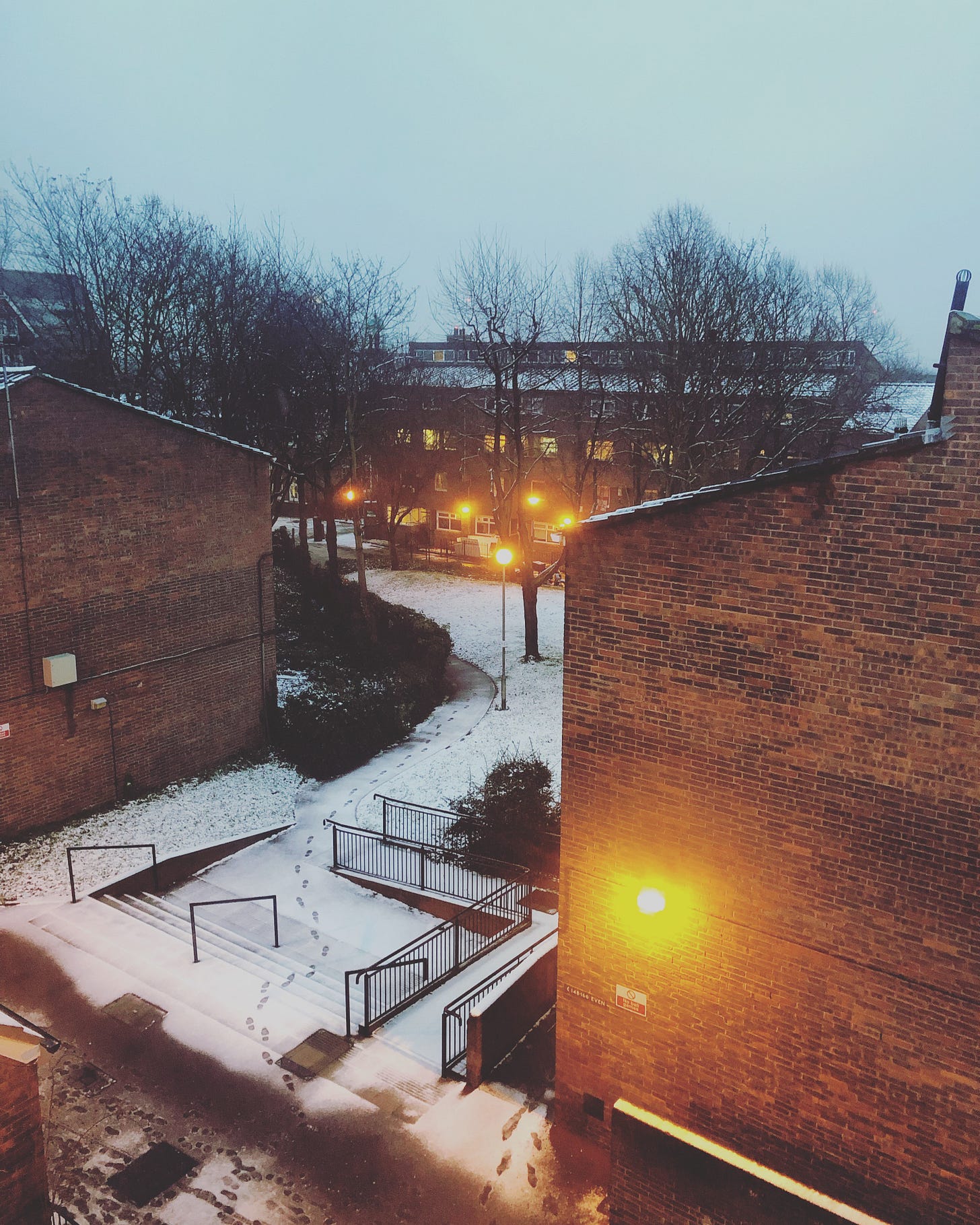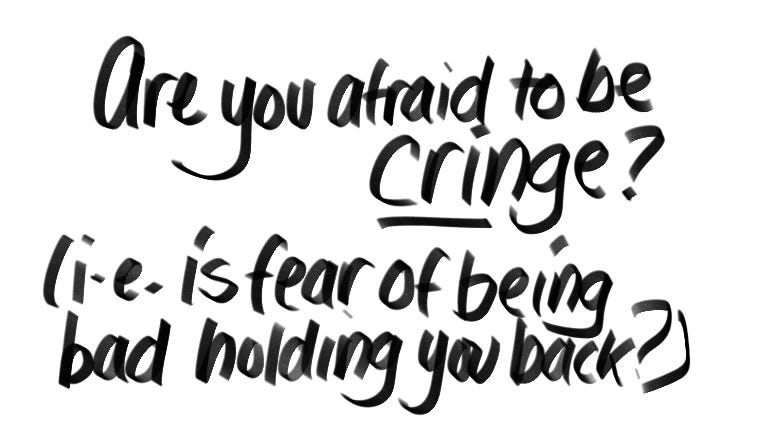Is fear of being bad holding you back?
The risk vs reward of trying new things, putting yourself out there and being bad.
I asked recently to hear what people would tell their younger selves about embarking on a creative journey, and something that came up was the importance of putting work out into the world - including before you are “ready”. This answer really stood out:
“Don’t cling to the idea of your own potential - the fact that it always outstrips your current ability will leave you paralysed… Put work out there, even if unfinished or tacky, even if it humiliates and embarrasses you to do so. Refinement is crucial, revision is crucial, but they’re worthless if done on a project that effectively remains invisible to all eyes save your own. Don’t spend years of your life contemplating the colour palette for an invisible portrait.”
(Thank you Nick Rowley for this quote!)
Very well put, and it speaks to a fear I think many of us have when we’re just starting out: the horror of discovering we are painfully, hopelessly, bad at this thing we purport to love.
The Fear
“ ...the fear that your fate is in your own hands, but that your hands are weak.”
- Art & Fear, David Bayles & Ted Orland
This line I keep quoting from Art & Fear has been a touchstone on this question of fear because it gets right to the heart of the issue: the fear around sharing work is the fear of discovering you aren’t all you thought you’d cracked up to be.
Potential is a very seductive idea. As long as our potential has not been challenged, opportunities still feel open. A lot of people never put themselves out there because of how hopeful and comfortable potential feels. The fear of being cringe hinges on discovering that your talent falls short, and actually, people around you find you disappointing. In other words, facing the harsh reality of reactions to your work. So, there are two components to this:
How you feel about your own abilities/work
How others respond to your work
Our feelings about our own work are complex, ever-evolving and shifting. It’s hard to back yourself when you don’t have much “evidence” of your skill level - in writing novels, this can be very hard to acquire without some very big swings. But confidence is a moving goalpost: what would it take for you to truly feel confident? Every new piece of work often feels like starting again for the very first time, and in many ways, it is. And I do actually want that sense of discovery, because I sincerely want to keep making the best possible work I can make.
And when it comes the responses of others, Orland and Bayles divide this into two elements: acceptance vs. approval. Acceptance is "having your work counted as the real thing; approval means having people like it." We worry about both, every time we put something out into the world. Will it be recognised as legitimate work? And will I be the only one who likes it? This leads us neatly to risk.
The Risk
“There is no discovery without risk and what you risk reveals what you value.”
- Jeanette Winterson, Written on the Body
The ironic thing about risking your work on other people is that it’s scary because it’s vulnerable and it makes you feel vulnerable because it offers up something soft to scrutiny, and often it’s only by being vulnerable and revealing that we ever get any good at what we make. A rock and a hard place.
But let’s reframe. I’ve talked here about the risks of putting yourself out there - namely, that your sense of self may be challenged (you might not be considered an “artist” after all), and your talent may come into question (you’re “bad” at it). But what are the risks of not putting yourself out there?
You’ll never know if your work is appreciated by anyone/if it’s any good;
You’ll never connect via the thing you expressed (the opportunity for connection is limited);
You might never learn how to get any better and you might never make your best work;
There is no chance of a hopeful surprise.
I like the above quote from Written on the Body because it speaks to the question of what matters to you, and only you can answer that. If you value what you’re doing, you may have to take a risk or else risk never quite knowing one way or another. If you don’t risk your work to an audience - if it’s just for fun and nobody but yourself - then it’s okay not to put work out there. Nobody will force you to go outside your comfort zone. But there will be costs.
How do we address the fear?
A few questions I have to keep asking myself:
1. Who is this really for?
Some advice (An “Operating Manual for Not Quitting” from Bayles & Orland):
“A. Make friends with others who make art, and share your in-progress work with each other frequently.
B. Learn to think of A rather than the Museum of Modern Art, as the destination of your work.”
I’ve often struggled with the idea that my work has to be exclusively for me. On the one hand, people do see this as really comforting - and I get that. If it’s just for you, then as long as you like it, you’ve done what you set out to do. But I can’t pretend that I don’t want people to read my words. I do. Uncharitably, you might call that ego. Predictably enough, I prefer to think of it as an earnest desire to connect with other people.
Who are those other people? This is where the question gets interesting. I talk and think a lot about community precisely because of what is suggested in the above quote - if I make my peers part of my process, it feels less scary to put my work out to gatekeepers. This is a big part of why I have started and participated in many critique groups. It can be scary to find peers, but they’re out there. Lots of people want to make art. They might be the first trusted port of call, rather than the most insular gatekeepers in your art form.
2. Am I serious about being any good?
I’m sceptical about the question of talent. What if you just don’t have any? A response from Bayles & Orland:
The practical questions about talent come down to these: Who cares? Who would know? and What difference would it make? And the practical answers are: Nobody, Nobody and None.
If someone appreciates your work, what exactly are they appreciating? is it your talent, or something else? But let me back up a sec. Being “good” is such a minefield. But if you do send out your work beyond the peer circle, I think what Bayles & Orland lay out in the above quote really comes to the fore: nobody really knows for sure what “good” is, they just know what they like. It is an aesthetic judgement, in the end. There is no right or wrong.
But how do I square this away with wanting to be good at what I do? How do I know when I’ve achieved some kind of mastery? From where I stand now, it’s an impossible question, especially as capitalism regularly gets in the way of what is “good” in favour of what sells; what is given the chance to sell is usually about what already worked in the past - i.e. what doesn’t involve undue risk. See the trap? So if I want to be good, I have to figure out a way to get my work out there, I have to be able to take feedback to get better, and I have to balance this with knowing that striking out and risking it all is always going to involve fear. The fear won’t leave, but the risk is worth taking.
Some final thoughts (for now)…
Head high and fuck ‘em all.
- Nick Cave’s mother (according to this interview with Bella Freud)
Some degree of bravado in putting work into the world sure is useful. And while I really don’t want to end up the kind of writer who can’t take an edit, the risk of my shyness and fear going unchecked means they could be allowed to develop into a kind of stage fright, limiting how far I can go with this practice.
Here’s something I have noticed: it gets easier by making incremental steps. Every little push back becomes easier and easier to weather, and that gives me a bit more juice to up the ante and share work with a “scarier” prospect. I remember telling my partner in early days of our dating that I felt I was slowly getting used to throwing myself at the wall over and over. At the time I thought I was exaggerating for effect, but in hindsight I probably wasn’t exaggerating all that much after all - you are throwing yourself at the wall. And that’s exactly what counts.
Offering myself peace, choosing my moment carefully, and not sharing too soon - these are all options. But at the end of the day, I must find a way to gather myself up for the launch out into the void. And again, and again.
Until next time,
Be well.
CCx





